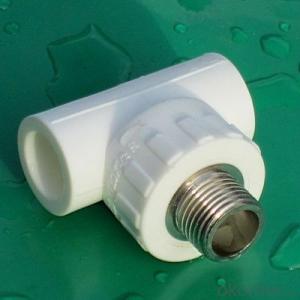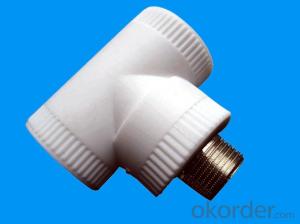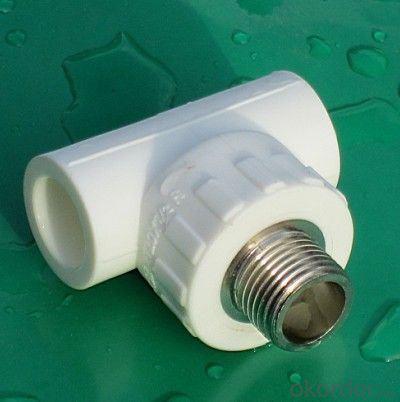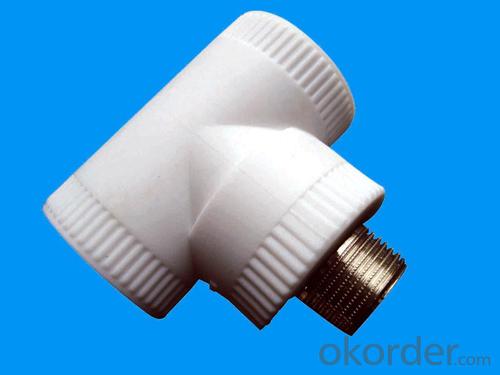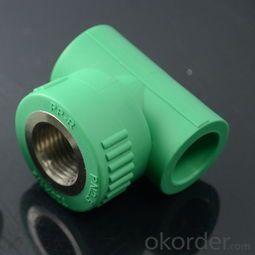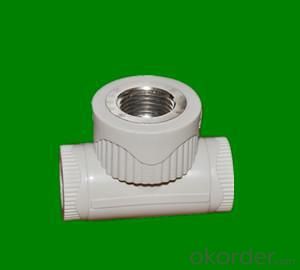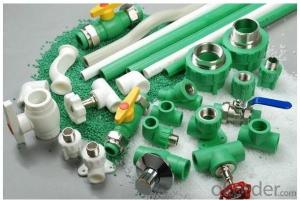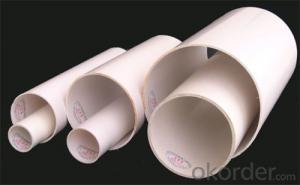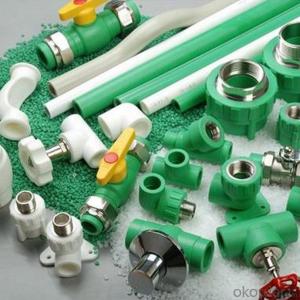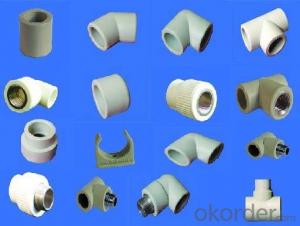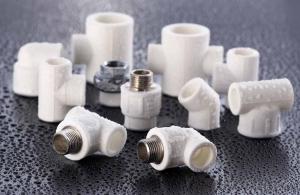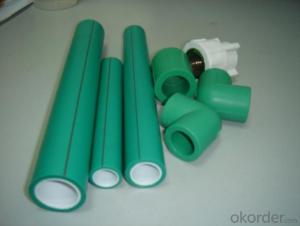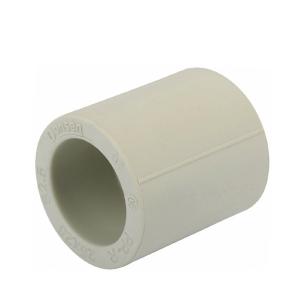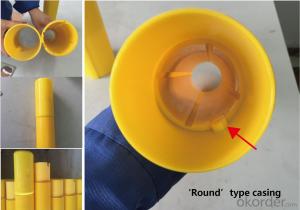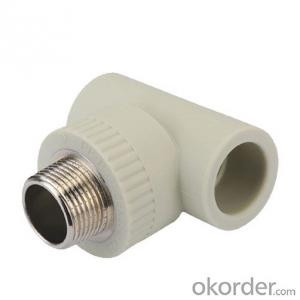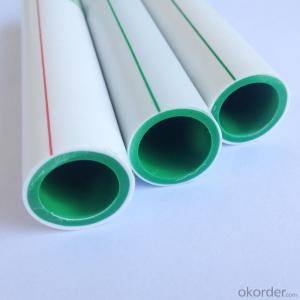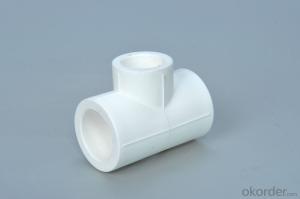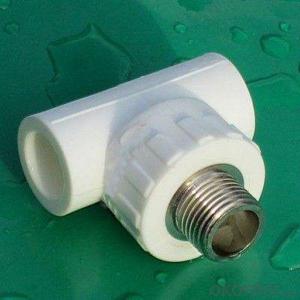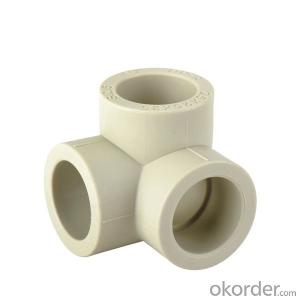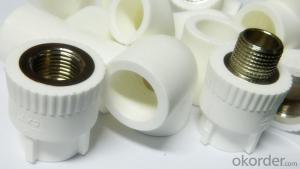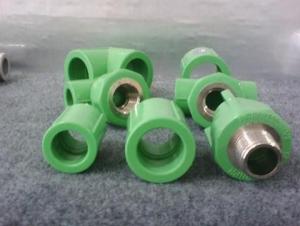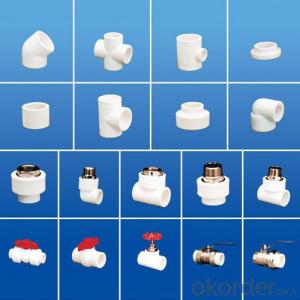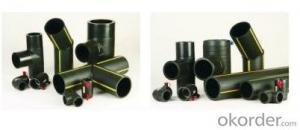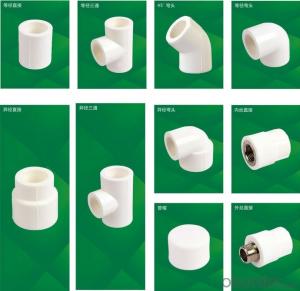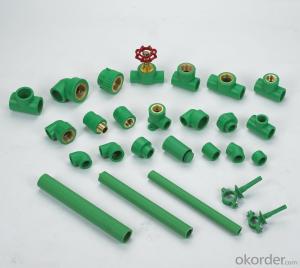Plastic Push Fittings for Copper Pipe - PPR Female Threaded Tee Fittings Made in China Professional
- Loading Port:
- Tianjin
- Payment Terms:
- TT OR LC
- Min Order Qty:
- 1000 pc
- Supply Capability:
- 100000 pc/month
OKorder Service Pledge
OKorder Financial Service
You Might Also Like
Product Overview:
1.It is used in industrial fields, agriculture and irrigation.
2.Beauty appearance.
3.Thermal insulation and energy saving.
4.Easy installation
5.excellent heat resistance and pressure resistance
6.affordable price
Specifications
Standard: DIN8077/8078
Material: R200P from Korea
Size: DN20-63
Color: Green, White, Grey, Blue
Packaging & Delivery
Packaging Details: PE bag + carton
Delivery Detail: 15 Days
Our Advantages:
1) Healthy, bacteriological neutral, conforming to drinking water standards
2) Resistant to high temperatures, good impact strength
3) Convenient and reliable installation, low construction expenses
4) Excellent heat-insulation property from minimum thermal conductivity
5) Lightweight, convenient to transport and handle, good for labor-saving
6) Smooth inner walls reduce pressure loss and increase flow speed
7) Sound insulation (reduced by 40% compared to galvanized steel pipes)
8) Light colors and excellent design ensure suitability for both exposed and hidden installation
9) Recyclable, environment-friendly, accords with GBM standards
Product Description
Product name | Size | Weight | Pack |
Equal tee | (Gram/m) | (m/pack) | |
T16 | 12.5 | 1300 | |
T20 | 19.4 | 800 | |
T25 | 30.5 | 450 | |
T32 | 48.2 | 260 | |
T40 | 90.8 | 150 | |
T50 | 142.5 | 106 | |
T63 | 275.3 | 54 | |
T75 | 515.0 | 30 | |
T90 | 712.0 | 18 | |
T110 | 1082.0 | 12 | |
T125 | 1544.0 | 8 | |
T160 | 2531.0 | 4 |
Product Show
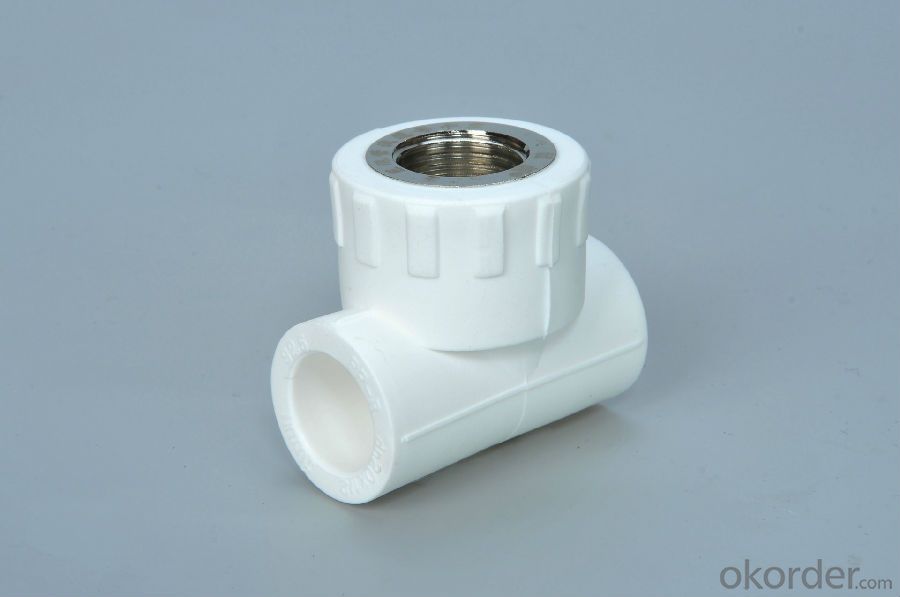
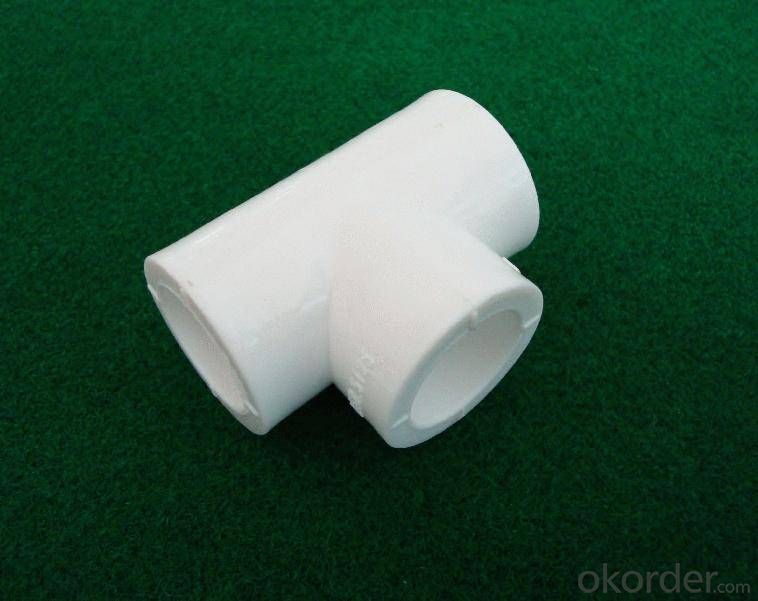
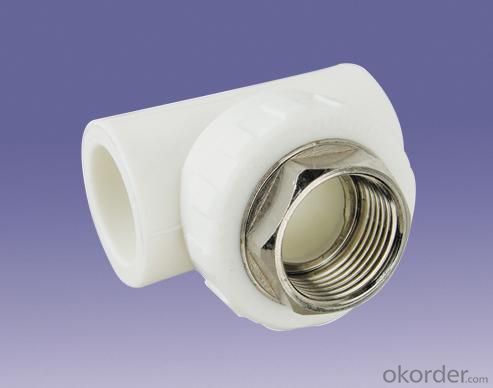
Main Product Features:
Large drum hub to maximize cable life
Self-activating automatic brake hold the load securely when crank handle is released
With cable or strap
Safety guard cover available
Top quality with competitive price
Widely used in the double beam bridge crane and gantry crane
Easy to install and high quality
Compact structure and reasonable design
Could be mounted on t he ground or wall!
Double drum!!
FAQ
Q1: How Can I Get A Sample?
A1: You can get samples by communicate with our export sales.
Q2: How Long Is Delivery?
A2: Delivery time will be30-45days according to order quantity.
Q3: What Is The MOQ?
A3: MOQ depends on different items.
Q4: What Is Our Normal Payments Terms?
A4: Our normal payment terms now is: T/T, L/C or western union, pay
- Q: Can plastic pipe fittings be used in plumbing systems?
- Yes, plastic pipe fittings can be used in plumbing systems.
- Q: Can plastic pipe fittings be used in fish farming systems?
- Yes, plastic pipe fittings can be used in fish farming systems. They are commonly used due to their durability, flexibility, and resistance to corrosion. Plastic fittings are easy to install, maintain, and can be customized to fit the specific needs of the fish farming system. Additionally, plastic fittings are non-toxic and do not leach harmful substances into the water, making them safe for the fish.
- Q: Can plastic pipe fittings be used for pressure washing systems?
- No, plastic pipe fittings are not recommended for use in pressure washing systems. Pressure washing systems typically operate at high pressures, and plastic fittings may not be able to withstand the force and could potentially fail, leading to leaks or accidents. It is advisable to use fittings made from materials such as brass or stainless steel that are specifically designed for high-pressure applications.
- Q: What kinds of PE pipe joint
- PE is the most basic plastic of polyethylene plastics, plastic bags, plastic film and so on are PE, HDPE is a high crystallinity, non-polar thermoplastic resin. The appearance of the native HDPE is milky white and is somewhat translucent in the narrow cross section. PE has excellent properties that are resistant to most life and industrial chemicals.
- Q: Can a plastic pipe be evacuated into two vacuum?
- Yes, the polypropylene material can be made into a vacuum.
- Q: Can plastic pipe fittings be used for chemical storage tanks?
- No, plastic pipe fittings are not suitable for chemical storage tanks as they may not have the necessary chemical resistance and structural integrity required to safely store chemicals.
- Q: Are plastic pipe fittings suitable for water parks and pools?
- Yes, plastic pipe fittings are suitable for water parks and pools. Plastic fittings are resistant to corrosion, chemicals, and UV rays, making them ideal for use in aquatic environments. Additionally, plastic fittings are lightweight, easy to install, and cost-effective, making them a popular choice for water park and pool applications.
- Q: What are the common maintenance requirements for plastic pipe fittings?
- Common maintenance requirements for plastic pipe fittings include regular inspection for cracks or leaks, cleaning to remove debris or sediment buildup, and proper tightening of connections to ensure a secure fit. Additionally, it is important to avoid using harsh chemicals or excessive force during installation or maintenance, as this can damage the fittings.
- Q: Can plastic pipe fittings be used for power plant cooling systems?
- Yes, plastic pipe fittings can be used for power plant cooling systems. Plastic pipe fittings are commonly used in various industrial applications, including power plant cooling systems, due to their corrosion resistance, durability, and cost-effectiveness. However, it is essential to select the appropriate type of plastic pipe fittings that can withstand the temperature, pressure, and chemical requirements of the specific cooling system in the power plant.
- Q: Can plastic pipe fittings be used for compressed gas systems?
- No, plastic pipe fittings should not be used for compressed gas systems as they may not be able to withstand the high pressure and can pose a safety risk. Metal fittings specifically designed for compressed gas applications should be used instead.
Send your message to us
Plastic Push Fittings for Copper Pipe - PPR Female Threaded Tee Fittings Made in China Professional
- Loading Port:
- Tianjin
- Payment Terms:
- TT OR LC
- Min Order Qty:
- 1000 pc
- Supply Capability:
- 100000 pc/month
OKorder Service Pledge
OKorder Financial Service
Similar products
Hot products
Hot Searches
Related keywords
